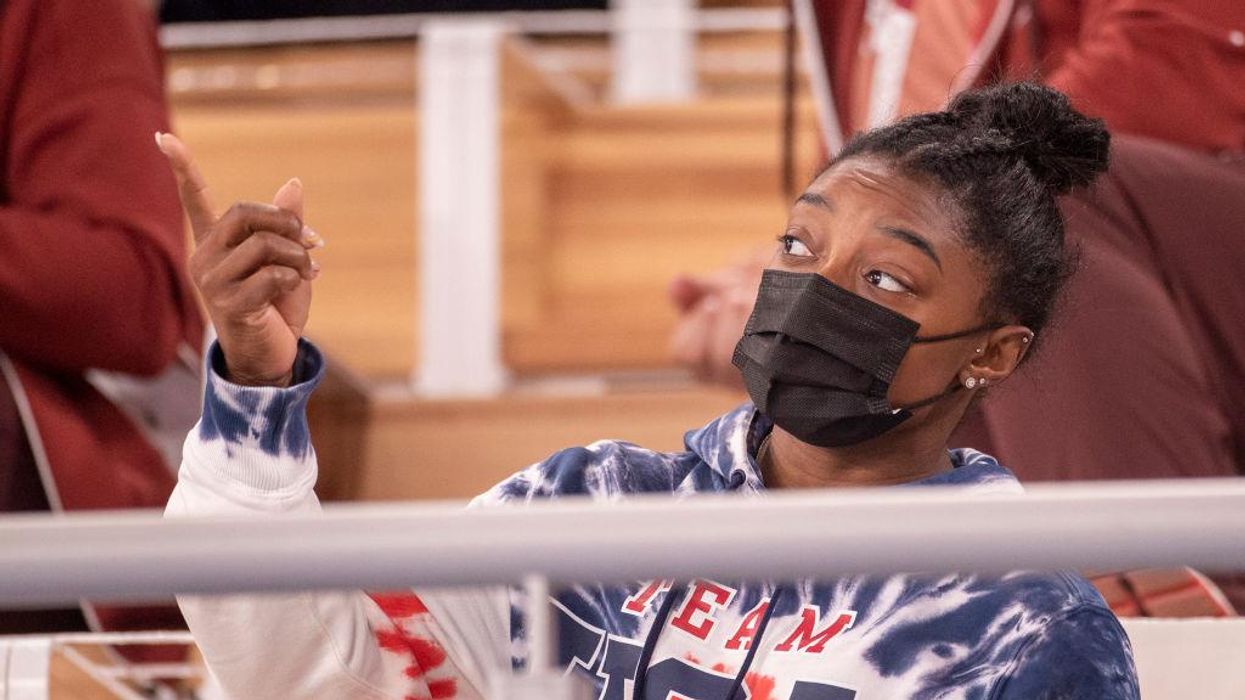
Tim Clayton/Corbis/Getty Images

America's pastime is a simple one: arguing left vs. right. Nothing in between. No gray area. Nothing murky, nothing blurred.
Simone Biles is the latest ball in play. The greatest gymnast of all time dropped out of team competition in the Tokyo Olympics Tuesday as the U.S. women tried to catch the Russians for the gold medal. Biles is so dominant that half of the sport's most advanced moves were her inventions and are named after her. Without Biles, it was hopeless for Team USA. Wednesday, she dropped out of the upcoming individual all-around competition.
Biles said dropping out to "take a back seat and work on my mindfulness" was a decision she had to make for her mental health. She said she was competing for others and not herself. This wasn't fun any more. It was overwhelming pressure.
With that, the argument started to divide along political lines, as every argument does these days. Should we be angry with Biles for walking out on her team and country at the biggest moment? Or should we feel sympathetic toward Biles, who apparently has a mental health crisis like so many Americans?
The answer is Option C: Both.
Mental health issues should be taken seriously, but you can't be so self-absorbed that you walk off in the middle of your sport's Super Bowl, as if you don't even know your teammates exist.
It's true that grinding it out is the definition of mental toughness, and all the great moments in sports history are examples. It's also true that today's young athletes face new problems, new challenges to their mental health.
Social media puts them constantly under a microscope. Interactions with technology instead of real people in front of them makes them less able to empathize, to see how their actions affect others.
Meanwhile, we keep throwing old maxims at these new problems. When a moment comes up like this, other generations start talking about how, back in their day, their leg split in two and they duct-taped it back together and finished the big game.
Mental toughness is important, and Biles has already proven hers. She couldn't have gotten to where she is without it.
However, never being able to escape the public eye has made her pressures different from what other generations faced.
"Last week I talked with an athlete who said, 'I can do 99 things right, but I do one thing wrong and the whole world knows immediately,'" Dr. Joel Fish, a nationally renowned sports psychologist, told TheBlaze. "The microscope has become worldwide."
Social media is one of the villains. That's where Biles is pressured to be perfect, "and perfection can eat you up," Fish said.
The pressure to be perfect turns you into a perfectionist. Perfectionism leads to mental health issues.
Or as Winston Churchill famously said: "The pursuit of perfection is the enemy of progress."
If we frame everything in an A or B binary, we'll never solve anything, because that's not about finding answers as much as scoring points.
Today's young people have a problem. We've seen Naomi Osaka and Kevin Love and Michael Phelps and others talking about mental health struggles.
And we frame that discussion as toughness vs. snowflakes when the issue is wrapped inside.
Biles should have been prepared for the moment. She put in the hours from her early childhood to be the best of all time.
She came to Tokyo with the demands that she's already the best ever and now she needs to get better. In the buildup of the Olympics, Biles was adding to the difficulty of her routines, inventing new moves that were beyond the moves no one else can do anyway. The pressure on her was this: Being the GOAT is not good enough. The gymnastics federation counted on her, the endorsers banked on her, even her Olympic teammates leaned on her.
That's what she signed up for, as has every GOAT in every sport before her. It was not unfair to her.
The flaw was in not preparing her with mechanisms to cope with the intense pressure that was always going to come with being Simone Biles. Did any of her development include training on how to take care of her mental health? It can't become part of the process only after the pain starts.
Today's kids live their lives on social media. Nothing is face-to-face. They think they're expanding their influence and exposure worldwide but are really living in a bubble. They make "friends" on social media with people they never actually meet.
That way, you don't ever have to interact with anyone.
So they are taught nothing about emotional intelligence, develop no empathy, learn nothing about being a selfless leader to others.
In gymnastics, unlike most sports, perfection requires every last second of competition to be mistake-free. One bad second and it's over.
When Biles wasn't perfect the first day, or in her attempt to land a vault the second day, she should have been able to turn to the coping tools she'd been taught.
With no tools, the greatest of all time simply tapped out. She hurt her teammates. She didn't even consider them. She never thought about how her actions would affect them as she walked off in the middle of a competition, like an actor leaving at intermission of a Broadway show.
Biles needed to work on herself, but shouldn't have been oblivious to the concept of Other People.
Biles' self-obsession at an Olympics is infuriating. I'm hoping she gets some help.